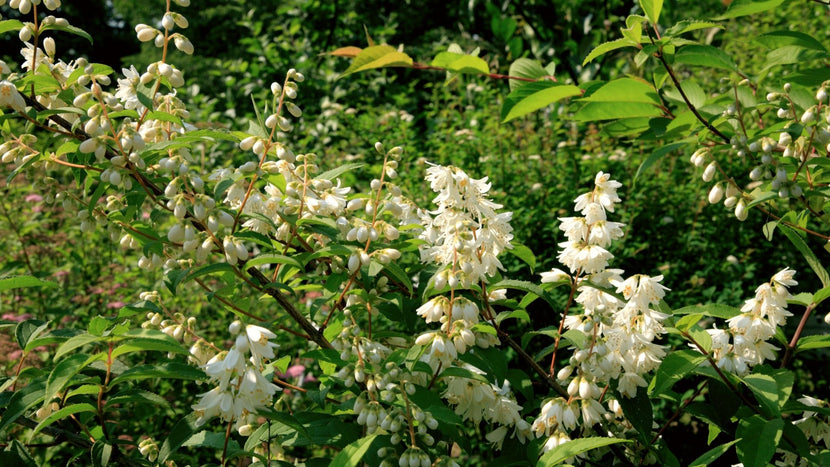How To Grow Deutzia
Plant Guide

Like many ornamental plants, Deutzia shrubs were not discovered in the wild, but rather was cultivated in Japan.
Named in honor of Dutch plant hunting patron, Johann van der Deutz, Deutzia is a hardy long-lived shrub that has gained popularity in gardens around the world. With over 60 species of Deutzia, the versatility of this shrub is limitless.
The unique spring flowering shrubs are loved for their tolerance to shady spots, mounding growth habits, and abundance of mid-spring blooms! Deutzia are actually members of the Hydrangea family, although the two plants do not have much resemblance.
Producing arched branches densely packed with bell-shaped blooms, Deutzia plants are magnificent deciduous shrubs and will surely make a statement in your landscape this season!
The popular yard plants do have a tendency to grow tall and wide so it is important you account for the plants average mature size (3 to 5 feet tall and wide) when planting. Read on to learn the best practices for growing and caring for Deutzia shrubs!
Ground Rules
Light
Deutzia grow best in conditions of full sun to partial shade, but they are not too picky and the easy-to-grow plants will happily tolerate less-than-ideal lighting conditions
Water
Once your Deutzia shrub is freshly planted in its new spot within your garden, this stage is critical and requires more water than your typical yard plant would need initially. During this early stage of planting, don’t rush the watering process. Water the plant close to the base of the trunk so the moisture can penetrate into the roots.
After a few weeks, reduce the watering schedule to every other day or longer. This largely depends on how quickly the soil dries out and how much sun or precipitation the Deutzia bush receives. When in doubt, don’t water it. The biggest reason plants die is because of overwatering, not under-watering.
Soil
Deutzia grow best in well-drained soils. Depending on the quality of your existing soil you may need to add a locally sourced compost or topsoil to the back-fill soil. We do not recommend using straight topsoil or compost as a back-fill soil because more times than not these products will retain entirely to much moisture and will cause the root system to rot.
Adding compost or topsoil will help the young feeder roots of your Deutzia shrub to spread through the loose, nutrient rich soil, much easier than if you used solely the existing soil which more times than not will be hard and compacted.
Food
Deutzias grow best if they are fertilized lightly in the spring once frost has passed with a well-balanced, extended-release, shrub fertilizer such as espoma Plant-tone. Fertilize your Deutzia again 6 weeks later to encourage faster growth of young shrubs.
Temperature
Hardy to USDA Zones 5 through 9, Deutzia shrubs can handle a wide range of temperatures, and depending upon the variety.
Toxicity
Deutzia bushes are not considered toxic to humans, nor are they toxic to animals. These stunning plants do not harm when consumed.
Mulch
We highly recommend that you mulch your Deutzia Nikko with either a ground hardwood mulch or a ground cypress mulch depending on your local availability. Any type of mulch will do, but cypress or hardwood mulch will be of a higher quality and provide better nutrition overall as they breakdown.
Planting Process
- Unbox the Deutzia Shrub plant and remove the packing. Water the plant and place it in a partially shaded location to acclimate to its new environment for a day or two.
- Select a location for your new plant(s) based on the light and soil requirements of the plant. Be sure to space out plants properly allowing room for growth.
- Dig your planting hole. It is important that the hole is deep and wide enough to encompass the plant's full root system.
- Place the top of the root ball level with the surface of the hole. If the deutzia is bareroot, the top layer of roots should be a few inches below the surface.
- Water your Deutzia shrub thoroughly.
- Backfill the rootball being careful not to leave any voids or air pockets. Mulch the plants with a thin layer of mulch or gravel to protect the root ball from the elements.
| Deutzia Type | Bloom Color |
|---|---|
| Proven Winners Color Choice Chardonnay Pearls Deutzia | Pure White |
| Nikko Deutzia | Bridal White |
| Proven Winners Color Choice Yuki Cherry Blossom Deutzia | Bubble Gum Pink |
